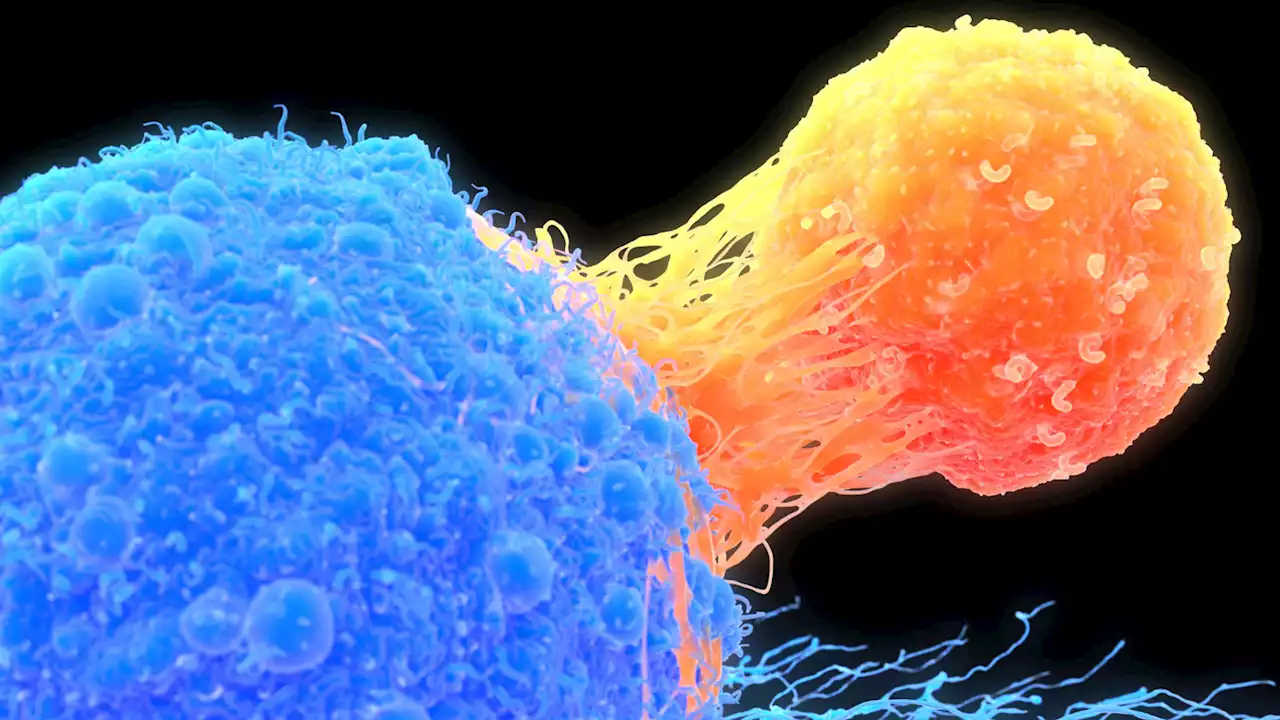Immune cells edited with CRISPR/Cas9 to fight cancer seem to be safe and long-lasting. WorldCancerDay
CRISPR/Cas9 is a two-part molecular tool for cutting DNA. One part, a snippet of genetic material called a guide RNA, leads the DNA-cutting enzyme Cas9 to specific spots in DNA where researchers want to make a change. In this case, the team altered three genes in immune cells called T cells. The edits were aimed toward making the T cells more efficient than usual in killing cancer cells.
Most of the cuts were right on target, but the gene editor made some cuts the researchers didn’t intend. These “off-target” cuts plus deletions and rearrangements of some DNA were found in a few edited cells. For instance, the sloppiest guide RNA caused 7,778 on-target edits and only 38 off-target edits. In seven of these off-target instances, the unwanted edits landed in thegene. Those edits are probably not dangerous as that gene is not active in T cells anyway, the authors say.
Scientists worry that editing mistakes, deletions and rearrangements may inactivate genes that restrict cell growth or create cancer-promoting mutations. But edited T cells containing off-target edits in the study didn’t appear to grow abnormally. The researchers used versions of CRISPR/Cas9 that were available in 2016, but the gene editor has since been improved to increase efficiency and decrease off-target cutting. So future trials might have more accurate editing, the researchers say.
Norge Siste Nytt, Norge Overskrifter
Similar News:Du kan også lese nyheter som ligner på denne som vi har samlet inn fra andre nyhetskilder.
 Genetically engineered immune cells have kept two people cancer-free for a decadeCancer doctors and researchers “don’t use words like ‘cure’ lightly or easily.” But with two patients remaining cancer-free for more than a decade, the therapy has performed “beyond our wildest expectations.”
Genetically engineered immune cells have kept two people cancer-free for a decadeCancer doctors and researchers “don’t use words like ‘cure’ lightly or easily.” But with two patients remaining cancer-free for more than a decade, the therapy has performed “beyond our wildest expectations.”
Les mer »
 Could Crispr Flip the Switch on Insects' Resistance to Pesticides?Many insects, like the mosquitoes that spread malaria, have evolved a tolerance to chemical sprays. What if we could reboot their genes?
Could Crispr Flip the Switch on Insects' Resistance to Pesticides?Many insects, like the mosquitoes that spread malaria, have evolved a tolerance to chemical sprays. What if we could reboot their genes?
Les mer »
 Sex differences in immune responsesCould biological sex differences in immunity bias males for severe COVID19? A SciencePerspective from last year explores various ways antiviral immune responses differ between the biological sexes, with implications for COVID19 severity.
Sex differences in immune responsesCould biological sex differences in immunity bias males for severe COVID19? A SciencePerspective from last year explores various ways antiviral immune responses differ between the biological sexes, with implications for COVID19 severity.
Les mer »
 This CRISPR startup thinks that mammoths can save the Arctic. Is it right?Colossal says that its plans to create a mammoth-elephant hybrid could ultimately help conservation and climate change.
This CRISPR startup thinks that mammoths can save the Arctic. Is it right?Colossal says that its plans to create a mammoth-elephant hybrid could ultimately help conservation and climate change.
Les mer »
 Genetically engineered immune cells have kept two people cancer-free for a decadeCancer doctors and researchers “don’t use words like ‘cure’ lightly or easily.” But with two patients remaining cancer-free for more than a decade, the therapy has performed “beyond our wildest expectations.”
Genetically engineered immune cells have kept two people cancer-free for a decadeCancer doctors and researchers “don’t use words like ‘cure’ lightly or easily.” But with two patients remaining cancer-free for more than a decade, the therapy has performed “beyond our wildest expectations.”
Les mer »
 Cancer patients cured a decade after gene therapy, doctors sayAfter two successful cases, scientists conclude that based on 10-year results, a treatment called CAR-T cell therapy can “actually cure patients of leukemia,” a scientist says.
Cancer patients cured a decade after gene therapy, doctors sayAfter two successful cases, scientists conclude that based on 10-year results, a treatment called CAR-T cell therapy can “actually cure patients of leukemia,” a scientist says.
Les mer »
